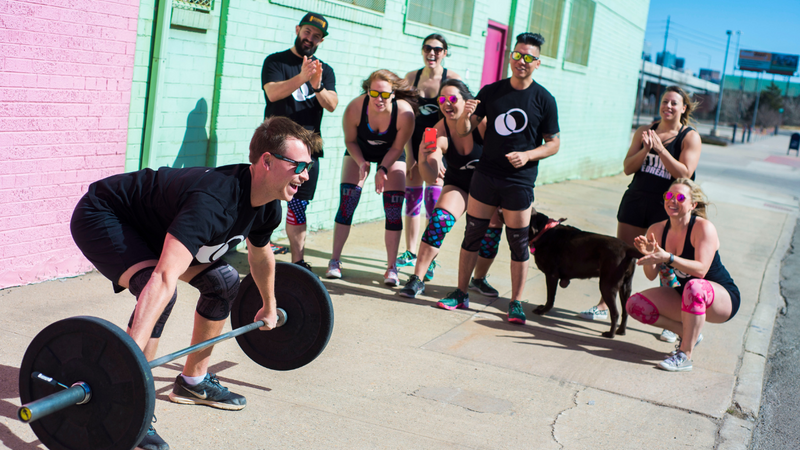By Malia Warren
Let's talk about self-control.
Today, we’re going to talk about self-control in the gym. Think of it like when someone pisses you off on the road. You either respond with anger, maybe a little bit of recklessness, OR you laugh to yourself and say “Today isn’t my day”, and move on.
Well, the same can be said for experiences in the gym.
Missing a lift, failing a muscle up, taking a chunk out of your shin on a box jump attempt - all things that might happen that cause us to blame ourselves.
In these situations, some might say to “Keep going”, “Don’t Quit”, or “Try Again”. But here’s why I don’t like that in weightlifting.
Do. Do Not. There is no try... again.

Weightlifting is a very prideful sport. We work hard and long to perfect our form so that we can make the lift and grab those three white lights (a perfect lift in competition).
That’s the thing though, we only have 3 attempts at a Snatch and 3 attempts the Clean and Jerk.
That’s it.
So no, we can’t keep going. No, we actually can stop… and try again another day.
If you've ever participated in a sanctioned weightlifting competition, you know the pressure and the limitations on chances to prove yourself on the platform, so I would daresay, you already know what it is to have self-control when training. High Five for that!
Set a Limit
When you’re going for your max and getting frustrated at failed attempts, how many do you allow yourself before you walk away?
I personally like the rule of 3, meaning 3 total attempts. Allow yourself two misses with the plan to hit the 3rd one. If you fail, that’s ok.

Walking away from the bar is not quitting. Saying, “I’ll try again later” is not quitting. Realizing that you just don’t have it today is actually self-rule and you should be proud of yourself as an athlete for that.
What are you missing out on? Nothing.
After two failed attempts, determined or not, your mental state capacity is compromised. Only go for that 3rd attempt if you are feeling strong and confident. Tell yourself you’ll be ok if you miss. Further attempts will wear you out, which is a potential breeding ground for injuries.

Be Vigilant
Another way to self-regulate is by watching for injuries. It’s ok to stop if your shoulder starts to act up. Or you tweak your elbow on a clean – this is YOUR workout and YOUR body, you know it best. Don’t let anyone belittle you for stopping or modifying due to injuries.
Remember though: Pain is different than fatigue.
Soreness because your body is entering the pain cave, is a lot different than pain because of an injury. Learn to listen to your body and be able to differentiate between the two. Any good coach in a sport with barbells will tell you to stop if you've injured yourself. But as a coach, we don't know if you're injured if you don't stop or say something and you're pushing through like nothing is wrong.
It's just not worth the extra damage you could do to your body - or the recovery time that comes with an injury.
For the love of all coaches everywhere: please don't do it. Show some self-control, and self-love while we're at it :)
Small Weights & Big Gains

Our last, and personally, my favorite of these suggestions on self-rule is to avoid loading the barbell more than you can handle.
In October of this year, I completed my certification to be a U.S.A Weightlifting (USAW) coach and we learned a ton of valuable information about safe increases in weight on the barbell.
Although it’s not set in stone, a good rule of thumb to assist your lifters or training partners in not going too heavy, or too fast, is a general increase of no more than 5KG, or 11 lbs.
This increase is a safe weight to stack on when working up to a max or heavy (70-80%) loads. It’ll help not to psych yourself out for the lift, too! It’s a good way to warm up and reduce injuries that can happen when jumping up in weight too fast, too quickly.
At the end of the day, you are in control of your own training and your own body. Over-training may feel good at the time, but you don’t know what damage you may be doing to your body long-term.
I’m not encouraging anyone to be a quitter, more so I want to see happy athletes that don’t injure themselves. Exercising a little self-control and knowing when to stop or reduce training can help you become a more well-rounded athlete anyway.
Connect with your body, listen to it, and remember, kids, Practice Safe Sets.
If you have any questions or you would like to be a guest blogger, please email us at blog@liftingthedream.com
What other methods of self-rule do you implement when lifting or workout out?
 |
Malia is the force behind Lifting the Dream and a proud mompreneur. When she's not lifting heavy weights, she's probably at the beach or Disney with her family. She is a Cali girl born and raised, with salt water in her veins and sunshine in her heart. She and her family now reside in Florida soaking up the sun, heat, and all the amazing outdoor activities this state has to offer. |





0 comments